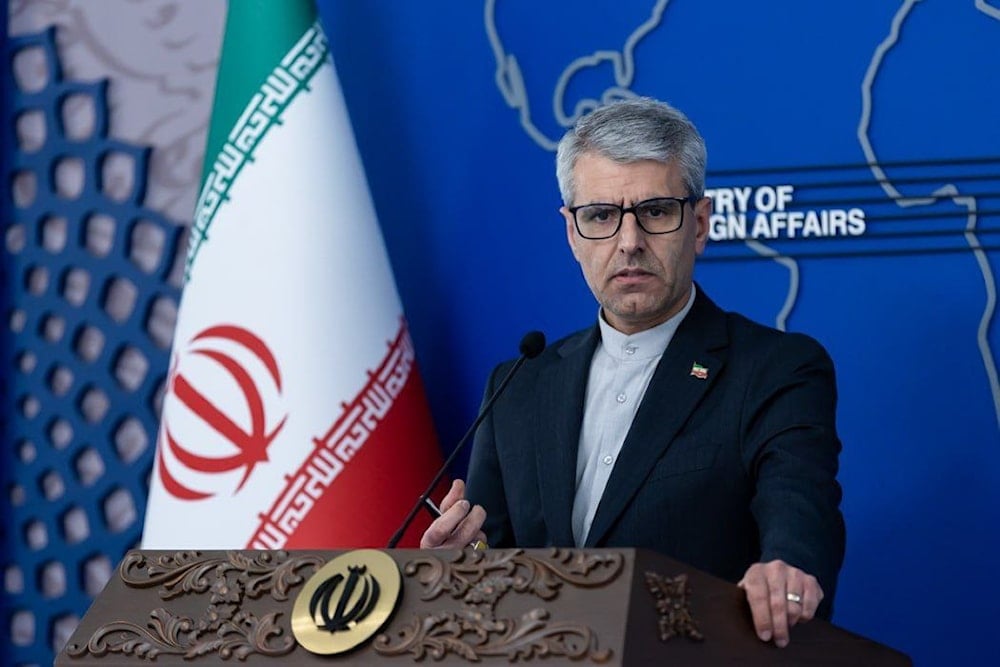Iran rejects G7 communiqué, accuses bloc of endorsing illegal actions
Iran condemned the G7's final communiqué as politically driven and legally unfounded, accusing the bloc of hypocrisy, bad-faith pressure over the JCPOA, silence on US-Israeli aggression, biased positions on Palestine, and false claims about Iran's role in the Ukraine war.
-

This undated photo shows Foreign Ministry spokesman Esmail Baqaei at a press conference (Iran MFA)
Iran has sharply criticized the final communiqué issued by the G7 foreign ministers after their meeting in Canada, denouncing the document as politically motivated and legally baseless.
The statement had included extensive commentary on Iran, urging Tehran to fully comply with its obligations under UN Security Council resolutions, demanding renewed cooperation with the International Atomic Energy Agency (IAEA), condemning Iran’s alleged military support for Russia, and endorsing efforts by the US and three European states to reimpose UN sanctions through the JCPOA dispute-resolution mechanism.
Baseless Allegations
Foreign Ministry spokesman Esmail Baqaei said the allegations directed at Tehran were “baseless, irresponsible, and unacceptable,” arguing that they reflected a long-standing pattern of biased positions by G7 members toward the Islamic Republic.
Baqaei condemned the G7’s explicit backing of the United States, United Kingdom, France, and Germany as they attempt to trigger the JCPOA’s dispute-resolution process to restore UN Security Council sanctions lifted under the nuclear deal.
He called this move “tantamount to their endorsement of an internationally wrongful act,” stressing that the G7’s position does not alter the “fundamentally illegal and unjustifiable nature” of the effort. Tehran maintains that the G7 is trying to legitimize a mechanism that was rendered void the moment Washington withdrew from the deal in 2018.
Western Double Standards
The spokesman also accused the G7 of deliberately overlooking a series of hostile acts carried out by the United States and “Israel” against Iran, including covert operations, military attacks, and strikes on Iran’s peaceful nuclear facilities, issues the communiqué did not address. Baqaei described as “hypocritical and interventionist” the bloc’s demand that Iran cooperate more fully with the IAEA, saying this call ignores “joint crimes of the United States and the Zionist regime.”
He added that Washington bears primary responsibility for the current nuclear standoff because of its “unlawful and unilateral withdrawal from the JCPOA in 2018” and its repeated sabotage operations targeting Iranian nuclear infrastructure.
Baqaei noted that the three European signatories to the nuclear agreement—Britain, France, and Germany—have consistently aligned themselves with US pressure policies, violating their JCPOA commitments and acting in “manifest bad faith” by refusing to implement economic obligations while supporting measures that undermine the deal. He argued that these states have disregarded Iran’s diplomatic initiatives and instead chosen to reinforce a coercive framework.
On Palestine
On the issue of Palestine, Baqaei criticized the G7 for adopting a one-sided stance that ignores "Israel’s" occupation and ongoing atrocities.
He said the bloc failed to uphold its international duty to defend the right of peoples to self-determination or to act against genocidal practices committed by the Zionist regime. According to him, the G7’s unconditional political and military support for "Israel" has rendered its human rights discourse “utterly devoid of legitimacy and credibility.”
On Ukraine Allegations
The spokesman also rejected the G7’s “repetitive and irresponsible” accusations regarding Iran’s alleged involvement in the Ukraine conflict. While the communiqué condemned Iran for what it claimed was military assistance to Russia, Baqaei reiterated that Tehran has had “no involvement whatsoever” in the war.
He reaffirmed that Iran’s position is rooted in opposing war and encouraging negotiations among the relevant parties. Those making accusations, he said, should “acknowledge and correct their own flawed policies regarding global peace and security” rather than blaming others.
Read more: Exclusive: Al Mayadeen obtains IAEA report on Iran’s nuclear program

 4 Min Read
4 Min Read










